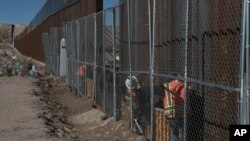The U.S. government plans to start awarding preliminary contracts by April for construction of a wall along the U.S.-Mexico border, to fulfill one of President Donald Trump’s principal campaign promises.
U.S. Customs and Border Protection said it will accept "concept papers" for the wall’s design beginning next week and will choose the best ones by March 20. The agency will then ask vendors for construction cost estimates and, after reviewing their bids, begin granting contracts by mid-April — a remarkably quick schedule for a government construction project.
Trump told the Conservative Political Action Conference on Friday that the border-wall project was "way ahead of schedule."
"We’re going to build a wall, don’t worry about it," Trump told a cheering crowd of his supporters. "We’re building a wall. We’re building the wall. In fact, it’s going to start soon."
Cost estimates vary
The Customs and Border Protection agency, a unit of the Department of Homeland Security, did not indicate where the initial phase of construction will begin.
Trump has said the wall will cost $12 billion, while Republican leaders in Congress have pegged its cost 20 percent higher than that. An internal Homeland Security report forecast the total cost could be as much as $21.6 billion.
Since the earliest stages of his presidential campaign in 2015, Trump has vowed to build a wall along the U.S. border with Mexico as a way to stop illegal immigration and drug trafficking. He has assured Americans that Mexico would pay for the wall — a claim denied repeatedly by Mexico’s elected leaders — and the issue has soured relations between the two countries.
Relations with Mexico sour
The White House has said Trump has a "buffet of options" to make Mexico to pay for the wall, including imposing a 20 percent tax on all imports from Mexico. Critics have said that scenario would mean American consumers actually would be paying for the wall.
The border barrier primarily would be aimed at stopping illegal immigrants from entering the United States. However, many Mexicans regard the idea of a wall as an insult, and authorities on both sides of the international border have predicted that rough terrain and large stretches of private property straddling the border could make building the wall a long, complicated project.













